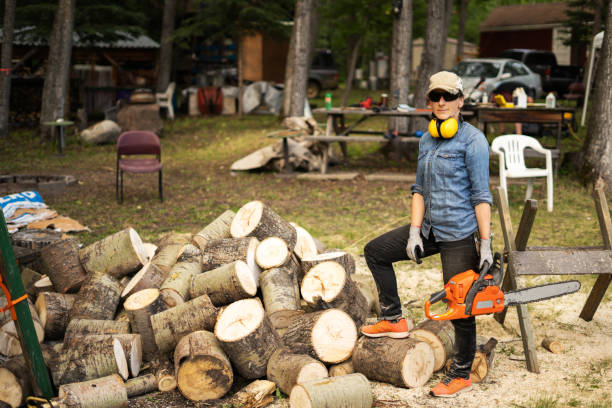Annually, Canada’s workforce is shrinking due to factors such as lower birth rates and an aging population, among others.
To meet this challenge, the country has established a goal of receiving 465,000 immigrants by 2023.
This strategic effort is enticing people from all around the world to settle in Canada and find work.
This effectively boosts the country’s economic prosperity and maintains its position as a leading global player.
While many Africans feel that migrating to Canada will provide them with immediate work prospects, the opposite may be true.
While some arrivals may be able to find work quickly, others may need to put in more effort and think strategically to prosper.
Thus, possessing trade skills is important, especially during times of unemployment.
Furthermore, even if one is currently working, these abilities can be used to supplement one’s income during leisure time.
If you are planning a relocation to Canada and are wondering what trade job to study, this post is for you!
We will show you the trades you should learn to survive in Canada as an immigrant, as well as other pertinent information.
Let’s get started.
What are trade skills?
A trade skill, often known as manual work, refers to vocations that require specific skills and knowledge obtained through means other than formal education.
These abilities are acquired through education at a trade school or by hands-on experience with seasoned professionals in your chosen area.
Trade workers’ skills vary depending on their specific training, with some requiring physical labor.
There are numerous trade occupations available in Canada that can pay well.
However, many of these occupations demand prior experience and training before you can begin working.
How to Improve Your Trade Skills Before Relocating to Canada
You have three major options if you’re new to trades and wish to learn:
1. Take up an apprenticeship
Apprenticeships allow you to gain hands-on experience while working with established professionals in your area.
It’s similar to on-the-job training in that you’ll be taught the necessary skills and procedures for the trade.
It can be difficult to locate these positions because most employers prefer employees with some basic knowledge, but if you do, it can be a terrific way to start your career in the trades.
2. Attend a Technical College
Going to a technical college to learn a trade skill entails enrolling in a program at a specialized school where you’ll receive hands-on training and education in a specific trade, such as plumbing, HVAC, or electrician work.
These programs, which can last anything from a few months to a couple of years, are designed to teach you the practical skills and information required for that trade.
Remember that there may be charges related to tuition and supplies, so think about your financial choices before enrolling.
3. Participate in a Specific Training Program
Joining a specific program to learn a trade skill entails enrolling in a training course tailored to teach you the skills and knowledge required for a certain job or trade.
These programs are typically more focused on the specialized abilities required for that trade.
When compared to longer college programs, they can provide a faster way to acquire the requisite knowledge.
Furthermore, several of these specialized programs may assist you in connecting with potential employers, enhancing your chances of obtaining work in that trade after completing the training.
Why You Should Learn a Trade Skill as an Immigrant in Canada
There are numerous reasons why you should study a trade before moving to Canada, whether through on-the-job training or a vocational training program.
Here are some of the advantages of choosing a trade:
-
Direct Experience
Acquiring skills on the job can be more successful for people who learn faster through hands-on training than classroom schooling.
Learning a trade through hands-on experience can lead to real-world projects and a diploma upon completion.
This reduces the time required to learn important skills and provides practical experience that may be limited in traditional university settings.
-
Cost-Effectiveness
Learning a trade is frequently less expensive than completing regular degree programs. In contrast to the huge financial loads carried by many university graduates, trade school tuition is designed to assist students in finishing with manageable or no debt at all.
Furthermore, apprenticeships or on-the-job training are frequently free, giving a direct path to skill acquisition without financial pressure.
Furthermore, community colleges and trade schools offer affordable associate degrees as well as financial aid options such as loans, grants, and scholarships.
Taking advantage of these financial resources allows you to complete your training with marketable skills, allowing you to secure possible work without incurring significant debt.

Trades You Should Learn To Survive in Canada as an Immigrant
In no particular sequence, the following are trade skills you can learn as an immigrant:
1. Event Planning
Event planning is a popular and developing job in Canada, ideal for those who enjoy organizing events.
Weddings, meetings, parties, and other types of events are all coordinated by event planners.
Because of Canada’s diverse and multicultural society, this role has become increasingly vital, necessitating a wide range of events.
To be a successful event planner in Canada, you must be skilled at organizing, communicating with people, and paying close attention to details, especially when things get hectic.
It’s also crucial to know people who can assist you with things like supplies and event locations.
You may make a solid living as an event planner in Canada, with an annual salary of roughly $66,679 that varies depending on your expertise and where you work.
2. Cooking
If you are unfamiliar with the preparation of your native meals, it is best to learn them before moving to Canada.
Cooking your meals might help you save money in the long run, as buying food can be pricey.
Aside from the personal benefits of cooking, it broadens your selection of work alternatives.
Knowing how to prepare your native cuisine can help you land a job in an international restaurant once you arrive in Canada.
You may also consider teaching cooking classes and charging, depending on your level of skill.
Catering is a skill that is in high demand for a variety of events, and skilled caterers charge hefty prices for their services.
Cooks in Canada earn an average yearly pay of $31,200, or $16 per hour. Entry-level employment normally pays $28,066 per year, with experienced cooks earning up to $40,950 per year.
3. Electrician
In Canada, becoming an electrician is a wise decision because it allows you to earn a lot of money and is in high demand.
Electricians work with tools to install, connect, and repair electrical cables and systems.
They deal with everything related to electricity, working in households by inspecting plans and in businesses and industries by dealing with cables, circuits, and electrical rules.
In Canada, the average salary for an electrician ranges between $39,000 and $91,000.
To become an electrician in Canada, you must complete an apprenticeship, pass tests, and obtain a license when you arrive.
4. Photography or videography
You can make money from photography or videography if you enjoy shooting images or making videos.
Photography and videography are ways to make money by capturing events, people, things, or scenes with cameras.
It’s a combination of capturing memories, displaying your artistic side, and selling photographs.
Photographers in Canada earn about $46,898 per year, or about $24.05 per hour.
When you first start, you may earn around $35,100 per year, while professional photographers can earn up to $64,866 per year.
If you want to run a successful photography business in Canada, you must work hard, think creatively, and be skilled at business.
You can run a profitable photography business by providing excellent service and satisfying your clientele.
To succeed and remain competitive, continue to learn and follow new trends in photography and filmmaking.
5. Plumbing
Do you enjoy interacting with others, repairing things, and working with your hands? If you do, you should learn to do plumbing before traveling to Canada.
Plumbers are professionals at installing, repairing, and maintaining pipes and other items that allow water to flow and waste to be disposed of in homes and businesses.
They also look for leaks and read blueprints. Plumbers in Canada might work for construction companies and factories or even start their plumbing enterprises.
They earn between $39,000 and $86,000 per year, or $30 to $40 per hour. They normally work 40 hours each week, although they sometimes have to work overtime.
FAQS
Which skill should I learn before moving to Canada?
Along with your original language, you must be fluent in English, and some students learn conversational French while in the nation.
This intercultural communication talent helps you communicate with people from other cultures despite linguistic barriers.
What is the average wage for skilled trades workers in Canada?
In Canada, the average skilled trades wage is $70,200 per year or $36 per hour.
Starting salaries for entry-level employment start at $53,625 per year, with most experienced professionals earning up to $90,838 per year.
Conclusion
You might not find work right away if you move to Canada.
So having abilities that can help you make money and serve others is beneficial.
This post discussed trades you should learn to survive in Canada as an immigrant which would allow you to earn a lot of money.
